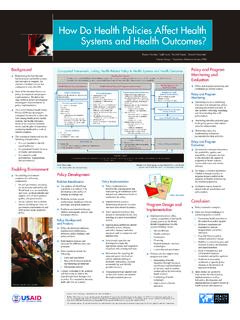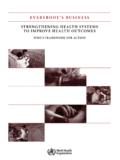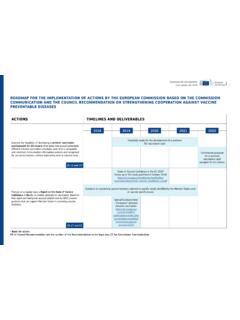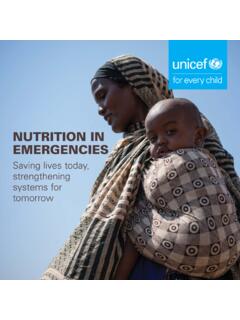Transcription of Strengthening health systems: the role and promise of ...
1 Strengthening health systems: the role and promise of policy and systems researchRapid progress towards disease control targets in developing countries is greatly hampered by weak,poorly functioning or in some cases non-existent health systems. It is critical to know how best toapproach health system Strengthening , and what specific actions are appropriate in different set-tings. Much is known about the barriers or constraints to scaling up health services. However,remarkably little is known about how best to relax these constraints. The central concern of this book is how knowledge of health systems can be significantly increasedand effectively applied to improve the health of the worst-off of the world s population.
2 The bookprovides important insights: Policies and programmes play a critical role in setting the research agenda and in enabling highquality research health systems research can significantly contribute to health policies and programmes. Lack ofresearch can lead to undesirable results. Research can contribute most when issues are formulated through clear and empirically verifiablehypotheses health systems research has developed a rich body of knowledge to support evidence-basedpolicy making Funding for health systems research in developing countries is at around of healthexpenditure, far too low to ensure impact Only 5% of total publications on health systems world-wide focus on developing countries Stakeholders support various priorities, and critical problems are not always targeted.
3 Priorities can be harmonized to advocate for increased funding; successful strategies have beendocumented Getting research to policy and practice can be enhanced through affordable interventions thatensure the pay-back from research Research capacity has to be strengthened across all regions through, among other strategies,problem-oriented stakeholder alliancesALLIANCE FOR health POLICY AND SYSTEMS RESEARCHS trengthening health systems: the role and promise of policy and systems researchStrengthening health systems: the role and promise of policy and systems researchALLIANCE FOR health POLICY AND SYSTEMS RESEARCHC ouverture_CAG 14:58 Page 1 Strengthening health systems: the role and promise of policy and systems researchALLIANCE FOR health POLICY AND SYSTEMS RESEARCHAn initiative of the Global Forum for health Research in collaboration with the World health Organization01-128_CAG 10:33 Page iiiStrengthening health systems: the role and promise of policy and systems , Alliance for health Policy and Systems Research, 2004 Global Forum for health Research, 2004 ISBN 2-940286-25-6 The reproduction of this book is regulated in accordance with the provisions of Protocol 2 of the Universal CopyrightConvention.
4 All rights are reserved by the Global Forum for health Research. The document may be freely reviewedand abstracted, with the usual acknowledgement of source, but not for sale or for use in conjunction with commercialpurposes. Requests for permission to reproduce or translate the book, in part or in full, should be addressed to theSecretariat where information on any translation or reprints is designations employed and the presentation of the material in this document do not imply the expression of anyopinion whatsoever on the part of the Secretariat of the Global Forum for health Research or the Alliance for HealthPolicy and Systems Research concerning the legal status of any country, territory, city or area or of its authorities, orconcerning the delimitation of its frontiers or concerning this publication can be obtained from.
5 Alliance for health Policy and Systems ResearchRPC-EIP, WHO, CH 1211 Geneva 27, SwitzerlandAll current Alliance publications and documents can be ordered in print format or obtained as electronic productsthrough the Alliance website at or by sending an e-mail to Design & Layout: L IV Com S rl, Morges, SwitzerlandCover photo montage composed of three photos (from left to right): an African doctor (UNAIDS/G. Pirozzi), Bolivian immunization (Pan-American health Organization), nurse in clinic (ILO/M. Crozet).01-128_CAG 10:33 Page iiiiiAbbreviationsivAcknowledgementsvExe cutive summaryviPrologueviiiChapter 1: Overview1 Chapter 2: Achieving global health goals: the role of health systems research7 Chapter 3: The state of the art in selected areas of health system research25 Chapter 4: Setting priorities in health systems research39 Chapter 5: Getting research into policy and practice51 Chapter 6: health systems research capacity in developing countries71 Chapter 7: Conclusions: The promise of health systems research91 Annex 1: Trends in international publications on health systems research95 Annex 2.
6 Partners of the Alliance for health Policy and Systems Research107 Board Members, International Advisory Group and Chapter Co-ordinators and Contributors117 CONTENTS01-128_CAG 10:33 Page iiiStrengthening health systems: the promise of policy and systems researchivASSALUDC olombian health Association CEHATC entre for Enquiry into health and Allied Themes (India)CMHC ommission on Macroeconomics and HealthCOHREDC ouncil on health Research for Development CSOC ivil Society OrganizationDALYD isability-adjusted life yearDANIDAD anish International Development Agency DFIDD epartment for International Development (United Kingdom)DGISM inistry for Development Cooperation (the Netherlands)HNPH ealth, Nutrition and Population (World Bank)HRPUNDP/UNFPA/WHO/World Bank Special Programme of Research, Development and ResearchTraining in Human Reproduction IDRCI nternational Development and Research Centre (Canada)
7 IHPPI nternational health Policy ProgrammeINCLENI nternational Clinical Epidemiology Network MDGsMillennium Development GoalsGAVIG lobal Alliance for Vaccines and ImmunizationGDNG lobal Development NetworkGRIPPG etting Research into Policy and Practice HEPNetHealth Economics and Policy Network for Sub-Saharan Africa MIMM ultilateral Initiative on Malaria NHSN ational health Service (United Kingdom)ODIO verseas Development Institute (United Kingdom)PAHOPan American health Organization PEPFARUS President s Emergency Plan for AIDS Relief PMTCTP revention of Mother to Child Transmission of HIVRED SALUDN etwork for health Systems and Services Research in theSouthern Cone of Latin America SARECS wedish International Development Cooperation Agency (SIDA) Department for ResearchCooperationSDOS ervice Delivery Organization (UK National health Service)TDRUNICEF/UNDP/World Bank/WHO Special Programme for Research and Training in TropicalDiseases TRIPST rade-related aspects of intellectual property rights (WTO agreement)ULPUser Liaison Program of the Agency for health Research and Quality WBIW orld Bank InstituteABBREVIATIONS01-128_CAG 10.
8 33 Page ivvThe principal writers of this review were Anne Mills (editor-in-chief ), Sara Bennett, Gerald Bloom, Miguel AngelGonz lez-Block (coordinating editor) and Indra Pathmanathan. The review was directed by the Board of the Alliance for health Policy and Systems Research and valuable input wasreceived from an international advisory group, whose members are listed at the end of the were provided by David Dror, Edward Elmendorf, Abdul Ghaffar, Steven Hanney, Rene Loewenson,Yuri de Lugt, Tim Martineau, Vic Neufeld, Yvo Nuyens, Jose Maria Paganini, Siriwan Pitayarangsarit, Bill Savedoff,Don de Savigny and Aparnaa Somanatha. Comments are gratefully acknowledged from Celia Almeida, Elsie LeFranc, Adnan Hyder, Stephen Matlin, Di Mcintyre, Don de Savigny, Yvo Nuyens, Ritu Sadana and Fabio and editorial support was provided by Ajay K Gupta, Mark Bloch and Chris details of Board members and the international advisory group, as well as biographies of chapter co-ordinatorsand contributors, are given at the end of the 10:33 Page vStrengthening health systems: the promise of policy and systems researchviImproved performance in controlling emerging and re-emerging diseases in developing countries is dependent onthe quality, equity and efficiency of health systems.
9 Rapid progress towards targets is greatly hampered by weak,poorly functioning or in some cases non-existent health systems. It is critical to know how best to approach healthsystem Strengthening , and what specific actions are appropriate in different settings. Much is known about the bar-riers or constraints to greatly increasing ( scaling up ) health services. However, remarkably little is known about howbest to relax these constraints, whether through reformed service delivery strategies, or different human resource man-agement policies, or new organizational structures. The central concern of this book is how knowledge of health systems can be increased and applied to improvethe health of the worst-off of the world s population.
10 health systems research has much to contribute to our under-standing of health systems and policies. Research can play a major role in policy formulation, especially when policyquestions can be formulated in terms of clear and empirically verifiable hypotheses. The book provides case studiesshowing that the application of health systems research has contributed to problem resolution, and that a widelyapplicable scientific body of knowledge is developing. Progress is reviewed in the areas of equity, user fees, commu-nity health insurance, management reforms and the role of civil society organizations. Decision makers and commu-nity advocates can benefit from this knowledge for the design and implementation of sound for health systems research in developing countries and by developing country researchers is suggests that such funding is at most of health expenditure, far too low to have an impact on healthsystem development.

















